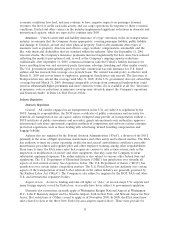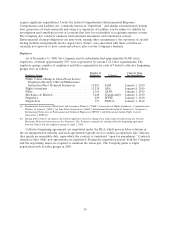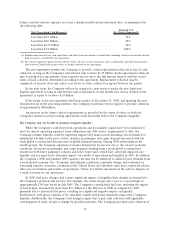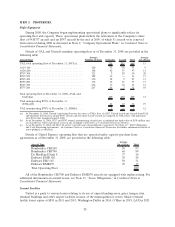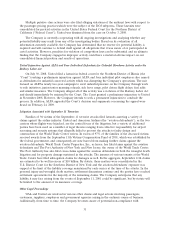United Airlines 2008 Annual Report Download - page 21
Download and view the complete annual report
Please find page 21 of the 2008 United Airlines annual report below. You can navigate through the pages in the report by either clicking on the pages listed below, or by using the keyword search tool below to find specific information within the annual report.a long-term basis may have a material adverse effect on our results of operations. Failure to update the
ATC system in a timely manner, and the substantial funding requirements of a modernized ATC system
that may be imposed on carriers like United, may have an adverse impact on the Company’s financial
condition or results of operations.
Many aspects of United’s operations are also subject to increasingly stringent federal, state and local
laws protecting the environment. Future environmental regulatory developments, such as in regard to
climate change, in the U.S. and abroad could adversely affect operations and increase operating costs in
the airline industry. There are a few climate change laws and regulations that have gone into effect that
apply to United, including environmental taxes for certain international flights, some limited greenhouse
gas reporting requirements and some land-based planning laws which could apply to airports and
ultimately impact airlines depending upon the circumstances. In addition, the EU has adopted legislation
to include aviation within the EU’s existing greenhouse gas emission trading scheme effective in 2012.
There are significant questions that remain as to the legality of applying the scheme to non-EU airlines
and the U.S. and other governments are considering filing a legal challenge to the EU’s unilateral
inclusion of non-EU carriers. While such a measure could significantly increase the costs of carriers
operating in the EU, the precise cost to United is difficult to calculate with certainty due to a number of
variables, and it is not clear whether the scheme will withstand legal challenge. There may be future
regulatory actions taken by the U.S. government, state governments within the U.S., foreign
governments, the International Civil Aviation Organization, or through a new climate change treaty to
regulate the emission of greenhouse gases by the aviation industry. Such future regulatory actions are
uncertain at this time (in terms of either the regulatory requirements or their applicability to United),
but the impact to the Company and its industry would likely be adverse and could be significant
including the potential for increased fuel costs, carbon taxes or fees or a requirement to purchase carbon
credits.
The ability of U.S. carriers to operate international routes is subject to change because the
applicable arrangements between the United States and foreign governments may be amended from
time to time, or because appropriate slots or facilities may not be made available. United currently
operates on a number of international routes under government arrangements that limit the number of
carriers, capacity, or the number of carriers allowed access to particular airports. If an open skies policy
were to be adopted for any of these routes, such an event could have a material adverse impact on the
Company’s financial position and results of operations and could result in the impairment of material
amounts of related tangible and intangible assets.
Certain aspects of United’s proposed cooperation with Continental through broad revenue and
codesharing and other commercial cooperation and Continental’s entry into the Star Alliance is subject
to receipt of certain regulatory and other approvals and the termination of certain contractual
relationships, including Continental’s existing agreements with SkyTeam members that restrict its
participation in another global alliance. The parties may not be successful in obtaining regulatory
approval or the timing for termination of existing contractual relationships may be delayed.
The Company’s plans to enter into or expand antitrust immunized joint ventures for various
international regions, involving Continental, United and other members of the Star Alliance are subject
to receipt of approvals from applicable national authorities or otherwise satisfying applicable regulatory
requirements, and there can be no assurances that such approvals will be granted or applicable
regulatory requirements will be satisfied. Other air carriers are also seeking to initiate or expand
antitrust immunity for joint ventures which, if approved, could adversely affect the Company’s financial
position and results of operations.
Further, the Company’s operations in foreign countries are subject to a variety of laws and
regulations in those countries. The Company cannot provide any assurance that current laws and
regulations, or laws or regulations enacted in the future, will not adversely affect its financial condition
or results of operations.
21


